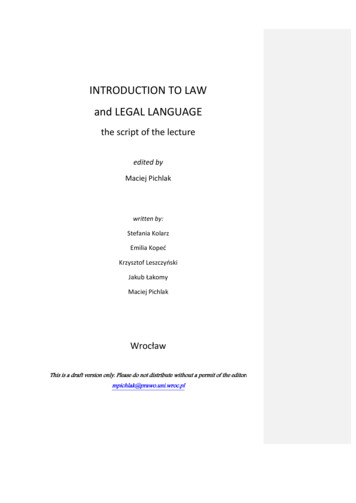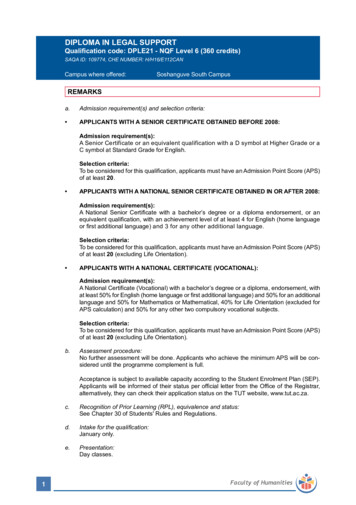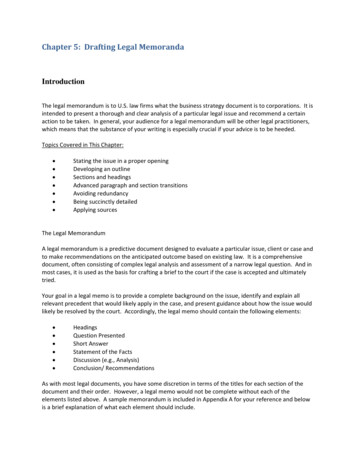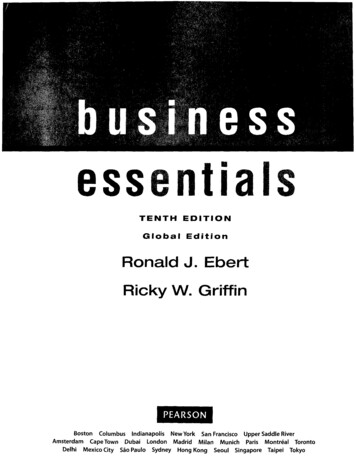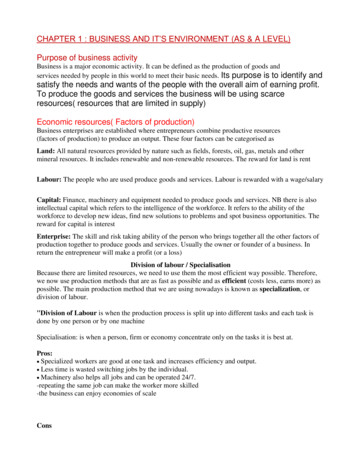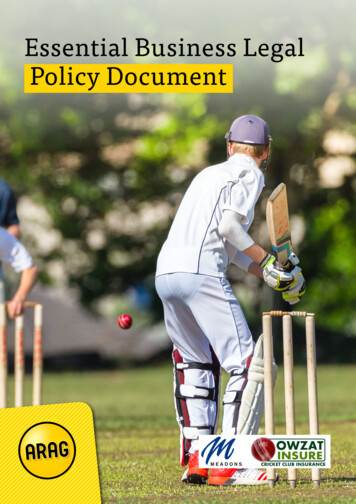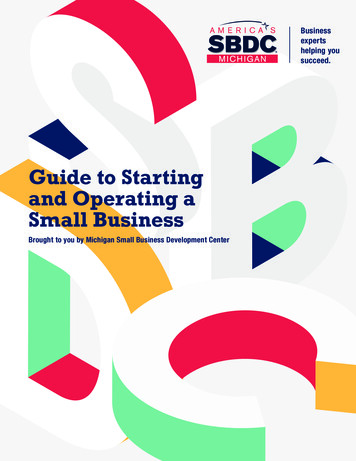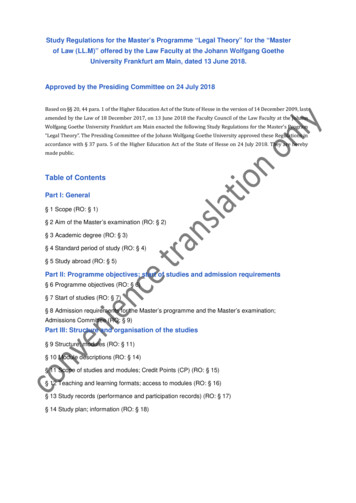
Transcription
SYLLABUSBLAW 2203 – Legal Environment of BusinessFall Term 2020College of BusinessDept. of Accounting, Finance & M.I.S.Instructor:Lawrence J. Trautman, MBA, J.D.Section # and CRN:Z01 (CRN16026)Office Location:Agriculture/Business Multipurpose Building, Rm. 337Office Phone:936-261-9222 (given the Covid-19 situation, please use email)Email Address:LJTrautman@pvamu.eduOffice Hours:Friday’s via Zoom (& by appointment)Mode of Instruction:Online onlyCourse Location:Agriculture-Business Multipurpose BuildingClass Days & Times:T/R 4:30 p.m. - 5:50 p.m. [Online only]Catalog Description:BLAW Legal Environment of BusinessA survey of the U.S. legal system with an emphasis on aspects relevant to businessoperations. Topics include legal systems, constitutional law, criminal law, propertylaw, torts, and basic contract law.Prerequisites:Passing University admissions reading testCo-requisites:NoneRequired Texts:Business Law: Text and Cases (15th Edition), by Kenneth W. Clarkson & Roger LeRoyMiller ( 2019, 2021)Publisher: CengageISBN13:978-0-357-12963-0Available in various formats: eBook only, or with various paper book optionsAt PVAMU bookstore.Recommended: Ben Mezrich, The Accidental Billionaires: The Founding ofFacebook (Anchor Books, 2009).Student Learning Outcomes:ProgramUpon successful completion of this course, students will be able to:LearningOutcome #Alignment1State and apply the fundamental principles of the Common Law system,including significance of precedent and the analytical methods used.BBA 1a2Identify the primary sources of U.S. law and those sources’ relativeBBA 1aimportance.3State and apply the role of the Commerce Clause of the U.S. Constitution indetermining the application of state and federal laws to business activities.BBA 1a4State and apply the rules protecting “real property” and “personal property”and their differing application to items and interests.BBA 1a5Identify the distinctions between “intentional” and “unintentional” torts.BBA 1a6State and apply the elements of, and defenses against, a cause of actionfor negligence.BBA 1a1[syllabus subject to change]
State and apply the requirements for creating (the “elements” of) a contractunder Common Law contract law rules.8State and apply the principal distinctions between criminal law and civil law.9State and apply the fundamental principles of Antitrust Law-RegulatoryEnvironment10 State and apply the fundamental principles of Employment Law11 State and apply the fundamental principles of Corporate Governance12 Ethics: Students will recognize and analyze a legal ethical problem and beable to choose and defend a solution.Major Course Requirements7BBA 1aBBA 1aBBA 1aBBA 1aBBA 1aBBA 1aBBA 2aMethod of Determining Final Course GradeCourse Grade Requirement10 Reaction Papers:Topics to be assignedAttendance &participation - combinedscoreClass PresentationLegal Research andWriting Term Paper50%15%5%30%Not to exceed 3 sheets ofpaper front and back Eachreaction paper counts as 5%of your grade. Please showme you actually readassignment (For example; youmight write, “on page 12 theauthor says “xxxxxxxxx”.Then, tell me why importantor not. Use Microsoft Word,double spaced; 12pt. font; nofootnotes required.You may have questions towork on in groups that wewill review in class.Attendance and classparticipation is importantand will be a major portionof your grade componentfor this category.Spoken communication isan important skill. You willparticipate in groups todiscuss legal problems youfind in reaction papers.You will be assigned atopicand given a rubric. Papersshould be double-spaced,in Microsoft Word only;(include footnotes andsources).Total:Grading Criteria and Conversion:900 – 1000 points A800 – 899 B700 – 799 C600 – 699 D599 And Under FA 90.00 – 100%B 80.00 – 89.99%C 70.00 – 79.99%D 60.00 – 69.99%F 50.00 – 59.99%Detailed Description of Major Assignments:Assignment Title or GradeRequirementNo ExamsDescriptionIn lieu of Mid-term and final exams, we will have a legal research and writing term paper,due at the beginning of the last day of class. You will be assigned a topic and rubric as tohow it will be graded.2[syllabus subject to change]
Legal Environment of Business – Fall 2020DateChapterTopicWeek OneAugust 25ChapterIntroductions; Course Intro, value proposition, requirements, etc.The Importance of Reading-Ruth J. SimmonsWhat is Law – U.S. ConstitutionReaction Paper Assignment #1. IRAC! IRAC! IRAC!: How To BriefAny Legal Issue, available at http://ssrn.com/abstract 2827285.Read and write a brief reaction (not to exceed 1 sheet of paper front &back) about what you learned from reading this paper & whyimportant. Assignment 1 due before beginning of next class.August 27Chapter 1, 2What is LawPrecedents, Stare Decisis, Courts of EquityReaction Paper Assignment #2. The Demographics of Death: AnEarly Look at Covid-19, Cultural and Racial Bias in America (with ttp://ssrn.com/abstract 3677607. See”Course Grade Requirement(pg. 2); it’s 3 sheets of paper (front & back); double spaced; in MicrosoftWord; 12 pt. font; no footnotes required. Assignment 1 due.Assignment 2 due before beginning of class September 1st.Week TwoSeptember 1Chapter 3Assignment 2 due before beginning of class.The Legal SystemCourts & JurisdictionSources of our LawReaction Paper Assignment #3. Teaching Ethics and Values in anAge of Rapid Technological Change (with Kenneth J. Sanney, Eric D.Yordy, Tammy W. Cowart, and Destynie Sewell), available athttp://ssrn.com/abstract 3102552. Assignment 3 due beforebeginning of class September 8th.September 3Chapter 5Litigation Process; Importance of Ethics & Assumption of Good Faith.Week ThreeSeptember 8Chapter 4Assignment 3 due before beginning of class. Constitutional LawThe U.S. Constitution and business activitiesState-Federal conflictsInterstate/Intrastate Commerce ClauseSeptember 10Chapter 4Constitutional Law- ContinuedReaction Paper Assignment #4, A Descriptive Analysis of the FourthAmendment and the Third-Party Doctrine in the Digital Age!, 28 ALBANYLAW JOURNAL OF SCIENCE & TECHNOLOGY 73 (2018), available athttps://ssrn.com/abstract 3005714. Assignment 4 due on beforebeginning of class September 15th.Week FourSeptember 15Chapter 4Assignment 4 due before beginning of class.Analyzing constitutional issues through scrutiny test by the CourtsEqual Protection of the law, Due Process, 1st AmendmentReaction Paper Assignment #5, The SEC & The Internet: Regulatingthe Web of Deceit, 68 THE CONSUMER FINANCE LAW QUARTERLYREPORT 262 (2014), available athttp://www.ssrn.com/abstract 1951148. Assignment 5 due beforebeginning of class September 22nd. Also download and read3[syllabus subject to change]
Posted: No Phishing (with Mohammed T. Hussein, Emmanuel U.Opara, Mason J. Molesky and Shahedur Rahman), available athttp://ssrn.com/abstract 3549992. (This is a short paper we willdiscuss in class).September 17Chapter 43Administrative Law (SEC, FTC, Others)– Antitrust LawWeek FiveSeptember 22Chapter 44Assignment 5 due before beginning of class.Administrative Law ContinuedSecurities FraudReaction Paper Assignment #6, Cannabis At The Crossroads:Regulation, A Transdisciplinary Analysis and Policy Prescription (withDonald Mayer, Paul Seaborn, Adam Sulkowski and Robert T.Luttrell), available at http://ssrn.com/abstract 3541229.Assignment 6 due before beginning of class September 29th.Chapter 6Chapter 7Introduction to Torts Law (basic Tort theories/assault/battery)Intentional Torts – Elements of NegligenceIntentional Torts in Business Activities/DefensesWeek SixSeptember 29Chapter 10Assignment 6 due before beginning of class.Criminal Law – Elements of crimesCriminal – Sixth amendmentCriminal LiabilityReaction Paper Assignment #7, Governance of the Facebook PrivacyCrisis, available at http://ssrn.com/abstract 3363002. Assignment 7due before beginning of class October 6th.October 1Chapter 10Degrees in Crimes (petty, misdemeanor, rder.Week SevenOctober 6Chapter 8, 9Assignment 7 due before beginning of class.Internet Law, Cyber Crime, Social Media & PrivacyIntellectual Property RightsReaction Paper Assignment #8, Contracts in Brief (with Lora J. Koretz,Anthony L. McMullen and Michelle A. Romero), available athttp://ssrn.com/abstract 3571997. Assignment 8 due beforebeginning of class October 13th.No Mid-TermExamNo Mid-Term Exam – In lieu of mid-term exam, please use this timeto work on Legal Research & Writing Term Paper assignment duebefore last day of class.Chapter 11Assignment 8 due before beginning of class.Contracts – Basics and Formation. Reaction Paper Assignment #9,The Matrix: The Board’s Responsibility for Director Selection andRecruitment, 11 FLORIDA STATE UNIVERSITY BUSINESS REVIEW 75(2012), available at http://www.ssrn.com/abstract 1998489.Chapters 12,13, 14Concepts of Offer, Acceptance; Consideration/Capacity and LegalityMinor/Alcoholics/Insane/DuressSeptember 24October 8Week EightOctober 13October 154[syllabus subject to change]
Week NineOctober 20Chapters 34,35Assignment 9 due on paper before beginning of class.Employment Law/basic (Race, National Origin, Age) Religion, EEOC,Pregnancy, Disabilities Act, etc. Reaction Paper Assignment #10,[Employment Law] details to link will be provided. Assignment 10due on paper before beginning of class October 27th.Chapter 36Business OrganizationsSmall Businesses & FranchisesWeek TenOctober 27Chapter 37, 38Assignment 10 due on paper before beginning of class.October 29Chapter 37, 38Business OrganizationsWeek ElevenNovember 3Chapter 39, 40Business OrganizationsNovember 5Chapter 40Business OrganizationsChapter 40Chapter 42Business Organizations; Contemporary Issues in LawInvestor Protection and Corporate GovernanceNovember 12Chapter 41Business Organizations; Contemporary Issues in LawWeek ThirteenNovember 17Chapter 48Contemporary Issues in LawProperty/ Personal Property/Bailment/TenancyOctober 22Week TwelveNovember 10November 19Week FourtenNovember 24November 26Week FifteenDecember 1Contemporary Issues in LawChapter 49Contemporary Issues in LawCreation and Transfer of Interests in Real PropertyTo BeAssignedContemporary Issues in LawLast Day ofClassTerm paper due before last day of Class; late after class begins; nopapers accepted after end of day.5[syllabus subject to change]
This syllabus is subject to change at the discretion of the instructor to accommodate instructional and/orstudent needs.Course Procedures or Additional Instructor PoliciesTASKSTREAMTaskstream is a tool that Prairie View A&M University uses for assessment purposes. One or more of yourassignments may be required for submission as an "artifact,” an item of coursework that serves as evidence thatcourse objectives are met. More information will be provided during the semester, but for general information, youcan visit Taskstream via the link in eCourses.EXAMSEach exam will include “objective” questions, which may be “True/False,” “Matching,” and/or “Multiple Choice.”Exams may also include “story” or “essay” questions without suggested answers. All exams are “closed book,closed notes.”There will be NO “MAKE-UP” for any missed exam unless under documented emergencies. (See thePrairie View A&M University Student Handbook)Cumulative scores on regular exams is used to determine the course grade. The regular exams will be on thecourse material covered since the preceding exam and given on the dates shown in the Schedule of Classes.EXAMSThere will be NO “MAKE-UP” for any missed exams.SUBMISSION OF ASSIGNMENTSEach assignment must be submitted on paper, at the beginning of class on the date due.OTHER POLICIES & INFORMATIONOther class policies and information available on eCourses are incorporated in this syllabus and are equallyapplicable to this course’s grade and other policies.Items, policies, information and schedules may change during the term. Information on any changes willbe distributed via in-class handouts and/or posting on eCourses. Students are individually responsible forkeeping current on all class-related matters.REFERENCESWestlaw, Lexis/Nexis – both available through University library websiteStudent Support and SuccessJohn B. Coleman LibraryThe library and its partners have as their mission to provide resources and instructional material in support of the evolvingcurriculum, as a partner in Prairie View A&M University's mission of teaching, research, and service and to support theUniversity's core values of access and quality, diversity, leadership, relevance, and social responsibility through emphasison ten key areas of service. It maintains library collections and access both on campus, online, and through local agreementsto further the educational goals of students and faculty. Phone: 936-261-1500; Website: J. B. Coleman Library.Academic Advising ServicesAcademic Advising Services offers students a variety of services that contributes to student success and leads towardsgraduation. We assist students with understanding university policies and procedures that affect academic progress. Wesupport the early alert program to help students get connected to success early in the semester. We help refer students tothe appropriate academic support services when the student is unsure of the best resource for their needs. Some studentsare supported by faculty advisors in their respective colleges. Your faculty advisor can be identified in PantherTracks.Advisors with Academic Advising Services are available to all students. We are located across campus. You can find youradvisor’s location by academic major at the Academic Advising Website, Phone: 936-261-5911.The University Tutoring Center6[syllabus subject to change]
The University Tutoring Center (UTC) offers free tutoring and academic support to all registered PVAMU students. Themission of the UTC is to help provide a solid academic foundation that enables students to become confident, capable,independent learners. Competent and caring staff and peer tutors guide students in identifying, acquiring, and enhancingthe knowledge, skills, and attitudes needed to reach their desired goals. Tutoring and academic support is offered face-toface in the UTC, in virtual face-to-face sessions, and through online sessions at PVPlace. Other support services availablefor students include Supplemental Instruction, Study Break, Academic Success Workshops, and Algebra Study Jam.Location: J. B. Coleman Library, Rm. 307; Phone: 936-261-1561; Email: pvtutoring@pvamu.edu; Website: UniversityTutoring Center.The Writing CenterThe Writing Center provides well-trained peer tutors that assist students with writing assignments at any stage of the writingprocess. Tutors help students with various writing tasks from understanding assignments, brainstorming, drafting, revising,editing, researching, and integrating sources. Students have free access to Grammarly online writing assistance. Grammarlyis an automated proofreading and plagiarism detection tool. Student must register for Grammarly by using their studentemail address. In addition, students have access to face-to-face as well as virtual tutoring services either asynchronouslyvia email or synchronously via Zoom. Location: J. B. Coleman Library, Rm. 209; Phone: 936-261-3724; Website: The WritingCenter; Grammarly Registration.Academic Early AlertAcademic Early Alert is a proactive system of communication and collaboration between faculty, academic advisors, andPVAMU students that is designed to support student success by promptly identifying issues and allowing forintervention. Academic Early Alert helps students by providing a central location to schedule advising appointments, viewadvisor contact information, and request assistance. Students who recognize that they have a problem that is negativelyaffecting their academic performance or ability to continue school may self-refer an Academic Early Alert. To do so, studentswill log in to PVPlace and click on Academic Early Alert on the left sidebar. Phone: 936-261-5902; Website: Academic EarlyAlert.Student Counseling ServicesThe Student Counseling Services unit offers a range of services and programs to assist students in maximizing theirpotential for success: short-term individual, couples, and group counseling, as well as crisis intervention, outreach,consultation, and referral services. The staff is licensed by the State of Texas and provides assistance to students who aredealing with academic skills concerns, situational crises, adjustment problems, and emotional difficulties. Information sharedwith the staff is treated confidentially and in accordance with Texas State Law. Location: Hobart Taylor, 2nd floor; Phone:936-261-3564; Website: Student Counseling Services.Office of Testing ServicesTesting Services serves to create opportunities by offering suite of exams that aid in the students’ academic and professionalsuccess. Currently we administer entrance (HESI A2), college readiness (TSI assessment), Prior Learning (CLEP, DSST),and proctored exams. Location: Wilhelmina Delco, 3rd Floor, Rm. 305; Phone: 936-261-3627; Email: aetesting@pvamu.edu;Website: Testing Services.Office of Diagnostic Testing and Disability ServicesThe Americans with Disabilities Act (ADA) is a federal anti-discrimination statute that provides comprehensive civil rightsprotection for persons with disabilities. Among other things, this legislation requires that all students with disabilities beguaranteed a learning environment that provides for reasonable accommodation of their disabilities. If you believe you havea disability requiring an accommodation, contact the Office of Disability Services. As a federally-mandated educationalsupport unit, the Office of Disability Services serves as the repository for confidential disability files for faculty, staff, andstudents. For persons with a disability, the Office develops individualized ADA letters of request for accommodations. Otherservices include: learning style inventories, awareness workshops, accessibility pathways, webinars, computer laboratorywith adapted hardware and software, adapted furniture, proctoring of non-standardized test administrations, ASLinterpreters, ALDs, digital recorders, livescribe, and a comprehensive referral network across campus and the broadercommunity. Location: Hobart Taylor, Rm. 1D128; Phone: 936-261-3583; Website: Disability Services.Center for Instructional Innovation and Technology Services (CIITS)Distance Learning, also referred to as Distance Education, is the employment of alternative instructional delivery methodsto extend programs and services to persons unable to attend college in the traditional manner. The Center for InstructionalInnovation and Technology Services (CIITS) supports student learning through online, hybrid, web-assisted and 2-wayvideo course delivery. For more details and contact information, visit: CIITS Student Webpage; Phone: 936-261-3283.7[syllabus subject to change]
Veteran AffairsVeteran Services works with student veterans, current military and military dependents to support their transition to thecollege environment and continued persistence to graduation. The Office coordinates and certifies benefits for both the G.I.Bill and the Texas Hazlewood Act. Location: Evans Hall, Rm. 102; Phone: 936-261-3563; Website: Veteran Affairs.Office for Student EngagementThe Office for Student Engagement delivers comprehensive programs and services designed to meet the co-curricularneeds of students. The Office implements inclusive and accessible programs and services that enhance studentdevelopment through exposure to and participation in diverse and relevant social, cultural, intellectual, recreational,community service, leadership development and campus governance. Location: Memorial Student Center, Rm. 221; Phone:936-261-1340; Website: Office for Student Engagement.Career ServicesCareer Services supports students through professional development, career readiness, and placement and employmentassistance. The Office provides one-on-one career coaching, interview preparation, resume and letter writing, and careerexploration workshops and seminars. Services are provided for students at the Northwest Houston Center and College ofNursing in the Medical Center twice a month or on a requested basis. Distance Learning students are encouraged to visitthe Career Services website for information regarding services provided. Location: Anderson Hall, 2nd floor; Phone: 936261-3570; Website: Career Services.University Rules and ProceduresAcademic Misconduct (See Student Planner)You are expected to practice academic honesty in every aspect of this course and all other courses. Make sure you arefamiliar with your Student Planner, especially the section on academic misconduct (see University Administrative Guidelineson Academic Integrity). Students who engage in academic misconduct are subject to university disciplinary procedures. Aslisted in the PVAMU Undergraduate Catalog, Graduate Catalog, and the Student Planner, the following are examples ofprohibited conduct. This list is not designed to be all-inclusive or exhaustive. In addition to academic sanctions, any studentfound to have committed or to have attempted to commit the following academic misconduct may also be subject todisciplinary review and action as outlined in the PVAMU Student Planner.Forms of Academic Dishonesty:1. Cheating: Deception in which a student misrepresents that he/she has mastered information on an academicexercise that he/she has not learned, giving or receiving aid unauthorized by the instructor on assignments orexaminations. Examples: unauthorized use of notes for a test; using a “cheat sheet” on a quiz or exam; anyalteration made on a graded test or exam which is then resubmitted to the teacher.2. Plagiarism: Careless or deliberate use of the work or the ideas of another; representation of another’s work, words,ideas, or data as your own without permission or appropriate acknowledgment. Examples: copying another’s paperor answers, failure to identify information or essays from the Internet and submitting or representing it as your own;submitting an assignment which has been partially or wholly done by another and claiming it as yours; not properlyacknowledging a source which has been summarized or paraphrased in your work; failure to acknowledge the useof another’s words with quotation marks.3. Multiple Submission: Submission of work from one course to satisfy a requirement in another course without explicitpermission. Example: using a paper prepared and graded for credit in one course to fulfill a requirement and receivecredit in a different course.4. Conspiracy: Agreeing with one or more persons to commit an act of academic/scholastic dishonesty.5. Fabrication of Information/Forgery: Use or submission of contrived, invented, forged, or altered information in anyassignment, laboratory exercise, or test; tampering with or production of a counterfeit document, particularlydocuments which make up the student’s academic record. Examples: making up a source or citing nonexistentpublication or article; representing made up data as real for an experiment in a science laboratory class; forging achange of grade or student withdrawal record; falsifying any document related to a student academic exercise.8[syllabus subject to change]
Nonacademic Misconduct (See Student Planner)The University respects the rights of instructors to teach and students to learn. Maintenance of these rights requires campusconditions that do not impede their exercise. Campus behavior that interferes with either (1) the instructor’s ability to conductthe class, or (2) the ability of students to benefit from the instructional program, or (3) the rights of others will not be tolerated.An individual engaging in such disruptive behavior may be subject to disciplinary action. Such incidents will be adjudicatedby the Office for Student Conduct under nonacademic procedures.Sexual MisconductSexual harassment of students and employees at Prairie View A&M University is unacceptable and will not be tolerated.Any member of the university community violating the university’s sexual harassment policy will be subject to disciplinaryaction. In accordance with the Texas A&M University System guidelines, your instructor is obligated to report to the Officeof Title IX Compliance (titleixteam@pvamu.edu) any instance of sexual misconduct involving a student, which includessexual assault, stalking, dating violence, domestic violence, and sexual harassment, about which the instructor becomesaware during this course through writing, discussion, or personal disclosure. The faculty and staff of PVAMU actively striveto provide a learning, working, and living environment that promotes respect that is free from sexual misconduct,discrimination, and all forms of violence. If students, faculty, or staff would like assistance, or have questions, they maycontact the Title IX Coordinator at 936-261-2144 or titleixteam@pvamu.edu. More information can be found at the Title IXWebpage including confidential resources available on campus.Pregnancy, Pregnancy-related, and Parenting AccommodationsTitle IX of the Education Amendments of 1972 prohibits sex discrimination, which includes discrimination based onpregnancy, marital status, or parental status. Students seeking accommodations related to pregnancy, pregnancy-relatedcondition, or parenting (reasonably immediate postpartum period) are encouraged to contact Student Disability Services orthe Dean of Students’ Office for additional information and to request accommodations. More information can be found atthis webpage.Non-Discrimination StatementPrairie View A&M University does not discriminate on the basis of race, color, sex, religion, national origin, age, disability,genetic information, veteran status, sexual orientation or gender identity in its programs and activities. The University iscommitted to supporting students and complying with the Texas A&M University System non-discrimination policy. It seeksto establish an environment that is free of bias, discrimination, and harassment. If you experience an incident ofdiscrimination or harassment, we encourage you to report it. If you would like to speak with someone who may be able toafford you privacy or confidentiality, there are individuals who can meet with you. The Director of Equal Opportunity &Diversity has been designated to handle inquiries regarding the non-discrimination policies, and can be reached atHarrington Science Building, Suite 109 or by phone 936-261-1744 or 1792.Class Attendance Policy (See Catalog for Full Attendance Policy)Prairie View A&M University requires regular class attendance. Attending all classes supports full academic developmentof each learner whether classes are taught with the instructor physically present or via distance learning technologies suchas interactive video and/or internet. Excessive absenteeism, whether excused or unexcused, may result in a student’scourse grade being reduced or in assignment of a grade of “F”. Absences are accumulated beginning with the first day ofclass during regular semesters and summer terms. Each faculty member will include the University’s attendance policy ineach course syllabus.Student Academic Appeals ProcessAuthority and responsibility for assigning grades to students rests with the faculty. However, in those instances wherestudents believe that miscommunication, errors, or unfairness of any kind may have adversely affected the instructor'sassessment of their academic performance, the student has a right to appeal by the procedure listed in the UniversityCatalog and by doing so within thirty days of receiving the grade or experiencing any other problematic academic event thatprompted the complaint. Students can file Academic Complaints and/or Grade Appeals at this webpage.Technical ConsiderationsMinimum Recommended Hardware and Software: Intel PC or Laptop with Windows 10 or later version; Mac with OS High Sierra* Smartphone or iPad/Tablet with Wi-Fi* High speed Internet access 8 GB Memory9[syllabus subject to change]
Hard drive with 320 GB storage space15” monitor, 800x600, color or 16 bitSound card w/speakersMicrophone and recording softwareKeyboard & mouseMost current version of Google Chrome, Safari or Firefox*Smartphone, Google Chrome books and Android tablets may not be supported. iPads are the only tablets supported.Note: Be sure to enable Java & pop-ups in the Web browser preferencesParticipants should have a basic proficiency of the following computer skills: Sending and receiving emails A working knowledge of the Internet Microsoft Word (or a program convertible to Word) Acrobat PDF Reader Windows or Mac OS Video conferencing softwareNetiquette (online etiquette)Students are expected to participate in all discussions and virtual classroom chats as directed. Students are to be respectfuland courteous to others on discussions boards. Foul or abusive language will not be tolerated. Do not use ALL CAPS forcommunicating to others AS IT CAN BE INTERPRETED AS YELLING. Avoid slang terms such as “wassup?” and textingabbreviations such as “u” instead of “you.” Limit and possibly avoid the use of emoticons. Be cautious when using humoror sarcasm as tone is sometimes lost in an email or discussion post and the message might be taken seriously or soundoffensive.Video Conferencing EtiquetteWhen using Zoom, WebEx or other video conferencing tools, confirm the visible area is tidy, clear of background clutter,inappropriate or offensive posters, and other distractions. Ensure you dress appropriately and avoid using high traffic ornoisy areas. Stay muted when you are not speaking and avoid eating/drinking during session. Before class session begins,test audio, video and lighting to alleviate technology issues.Technical SupportStudents shou
1 [syllabus subject to change] SYLLABUS BLAW 2203 - Legal Environment of Business College of Business Fall Term 2020 Dept. of Accounting, Finance & M.I.S. Instructor: Lawrence J. Trautman, MBA, J.D. Section # and CRN: Z01 (CRN16026) Office Location: Agriculture/Business Multipurpose Building, Rm. 337 Office Phone: 936-261-9222 (given the Covid-19 situation, please use email)

